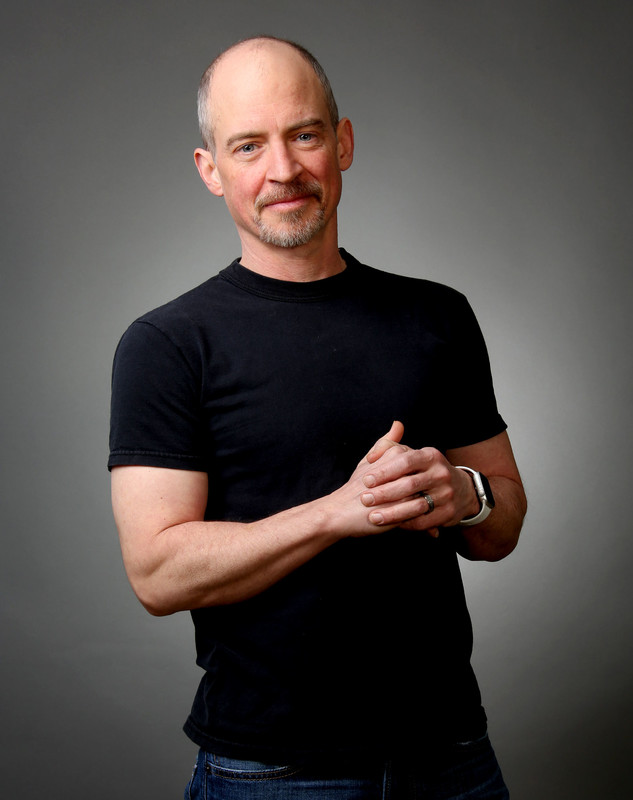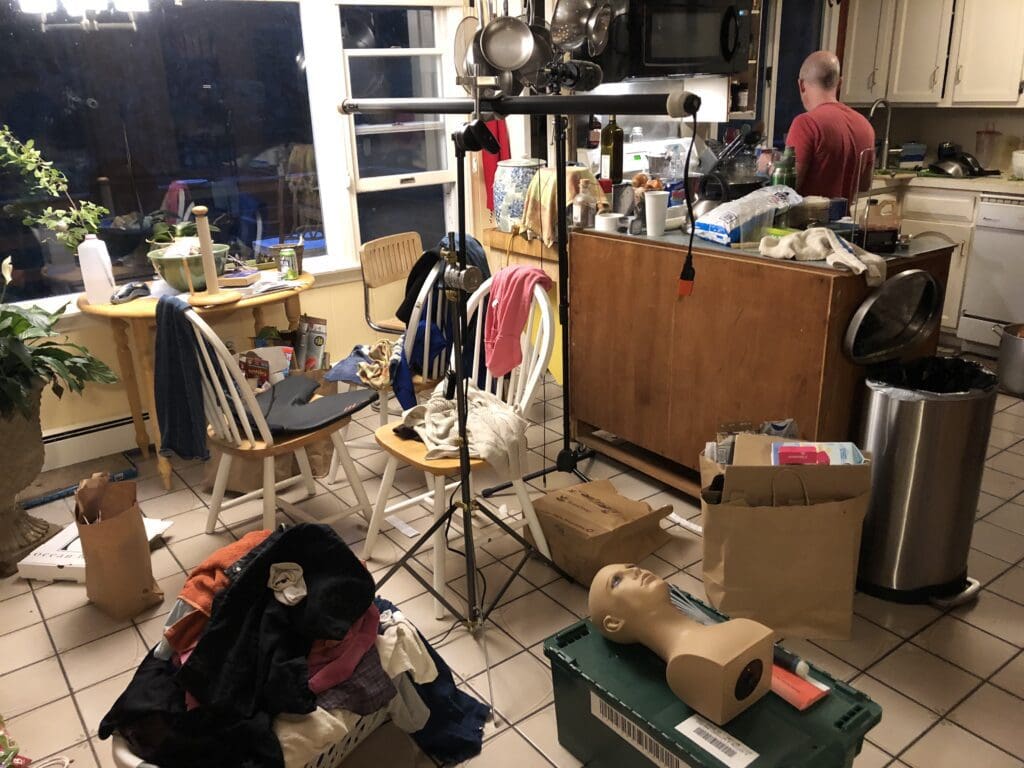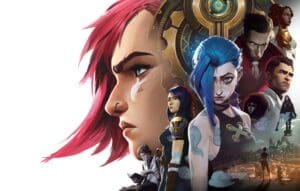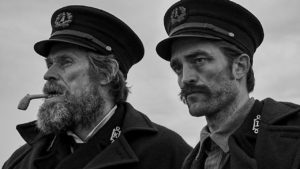It’s been a sad and strange twelve months, as no-one can deny; so it’s encouraging to see how some have carried on through. Red River Road was written, performed and filmed by a single family while staying home for everyone’s sake during the COVID pandemic. Paul Schuyler (wrote and directed the film) and his wife Jade gave me half an hour of their time to talk about the film prior to its world premiere at Grimmfest’s coming Easter event.
Normally, I’d ask interviewees what it’s been like working during the pandemic, but their whole film was made then, so I asked what they might have been doing if the world had been different. Paul answered “so we actually were prepping to shoot another movie called The Tuna Goddess, which started life as a script we were working on when we both met – that’s how we met, actually – then it got shelved, and Jade rewrote it as a play. We performed it here, and it was a hit, got picked up and got interest. A producer came and said ‘hey I’d like to adapt this as a movie’ and we were like ‘we already have the script!’ We got all the leads cast, like Jena Malone, and all ready to shoot in September. But when COVID hit, it was apparent to me that it wasn’t going away any time soon and what it did to our budget to even attempt to stick to that shooting schedule just made it impossible.”
Jade added, “Everything was up in the air. It was just too dangerous, too cost-prohibitive.”
Paul said, “We went to the cast, and they were really understanding and told us, ‘We’re here, when you’re ready, we’ll jump back on board’, so it’s still on the back burner.”
I asked a bit more about The Tuna Goddess. “It’s an intimate story,” said Paul. “In all intents and purposes it’s a rom-com, and in the play, we used that for some bait and switch: it’s a powerful drama too about a woman who has to reconcile her feelings about her estranged father; a grand, small movie.”
Back to Red River Road, and I asked about the bar code on the poster. Paul told me, “that references the ration box that they get. There’s this sort of unnamed and unknowable force that’s controlling everything they do, and as much as they try to maintain normalcy, there’s always this intrusion, this regulation: what they watch, eat, and so on.” So in principle, every household had a different bar code.
Red River Road was not the first film the Schuyler family had all been in together. I asked what had changed in the four years since performing in They Are Mine! “Tots to teenage boys is a big difference” laughed Jade. “Also, we didn’t direct that movie, we were a part of a friend’s project. They Are Mine! was a much easier film for us to do as a family because we weren’t trying to control everything. This film was difficult because we’d already been stuck in a house together for months and months, and now shooting late into the night, but they wanted to play on their video games, but they still had an interest in the film. I think they’re both pretty impressed by what came to be, but they’re still in that teenage phase of ‘yeah, whatever’”.
Paul added to that, “I think it’s also easier when it’s someone else’s film, and they’re taking direction from someone else. I think this was their first taste of Dad as a director.” He smiled at Jade: “you know what it’s like.” She laughed back, “SAG rules get thrown out when we work together! Actually though, we’ve all been on stage together as well: all four of us played in Oliver! many years ago, and it lit a little flame under them for acting. They’ve done some films, but mostly stage, and they love it.”
So which is more difficult to manage: the teenagers or the dog? “You know,” said Jade “our Brody is amazing, one of the smartest animals we’ve had. She’s eleven but looks really young. I trained her myself and she was wonderfully easy to train, a miracle almost: she was on cue, on time, did everything we wanted.” Paul reflected “originally there were just a couple of scenes with Brody, scenes where we talked about her. But gradually we tried more and it turned out so easy, so we shot whatever was happening when she seemed game: most of that survived.”
“I didn’t get any eye-rolls from Brody,” said Jade.
“You know it’s super frustrating,” said Paul “you know we drag them off the computer and say ‘we’ll need you for this two-hour chunk’, and they walk in (‘whatever’) do one take, then move on back to their room. We fester over it for hours!”
Red River Road is the street where the Schuyler family lived – “pretty meta!” laughed Jade – and the location of the house that they used for everything; sets, production office, etc. I asked what the logistics were like. “With every shot that you see in that movie,” said Paul “if the camera spun 180? there’d be a mountain of things. We just shoved things out of view. We wanted it to look sparse, kind of empty, and with two teenage kids in the house, the reality is anything but sparse. There was usually an hour of each day to clear a spot, all hands on deck: real chaos.”
“It was exciting, though,” said Jade. “It was wonderful to create something, especially when The Tuna Goddess was off the table for the time being. It was such a wonderful thing to be doing what we love to do, difficult though it was too with no crew and no support whatsoever. That kind of made it more exciting.”

The pair presented two different perspectives without disagreeing. Paul’s view: “It’s satisfying but draining, as most creative endeavors are. In the scheme of things, it’s not suffering at all to be able to be creative and constructive in such a weird time. A lot of people were scrambling just to get toilet paper. So even to be able to carve that space for ourselves: I feel grateful that we were able to do that.”
That creative space must have been a good challenge: “We’ve been told that one of the reasons they picked us for Grimmfest is that this was one of the few pandemic movies that actually felt like a movie, stepped past the Zoom thing with a real narrative. I’ve been telling people that once we’re back to ‘normal’, I think there’s going to be this big creative flourish, from all these people who didn’t even know they were artists but discovered something while they were stuck at home: I’m really curious to see what the next couple of years bring.”
I had read in the Red River Road press kit that Paul had kind of woken up one day with the story, so naturally, I asked him to tell me about that. “When we finally pulled the plug on The Tuna Goddess, I had that day of depression – so close, and it was yanked away from me – but I don’t like to sit and feel sorry for myself for long. Then it just suddenly occurred to me: we have everything we need to make a movie right here, don’t we? So I posed the question to Jade that we should think about doing something. Then late that night, I woke up from basically a sound stage: the movie was there as you see it, going in my head. So I grabbed a notebook to get everything before it faded. I don’t know where it came from.”
Jade added her perspective: “The next morning, he came down early and said ‘OK, family meeting! I have a story to tell’ and he just went through it.”
When I watched Red River Road, I enjoyed the gradual change of tone: it started off as a domestic drama (albeit in odd circumstances) and then followed the deterioration of the central character’s frame of mind. I couldn’t tell if it was speaking to what the world right now was going through, or presenting some madness that the Schuylers themselves were experiencing. So I asked what the theme was as far as Paul was concerned. “I think honestly because it came in such a rush, I just followed the instinct. David Lynch is a hero of mine, and I think his best movies are those which tap into something that he’s perhaps unaware of himself, not questioning but just capturing what he’s feeling. So as I cut the film, I realized this idea of creating our own reality is a big thing for me. What you guys are going through a bit in the UK, and we’ve gone through four years of folks saying ‘no: this is my reality, I’m going to fight for it’ and I think I was curious about that. Ultimately: what is real? What do you have a choice about? And what do you want to create? Even when these external factors seem to be against you… I think the main character, Anna, is struggling to find her footing, and even if she doesn’t have full autonomy, is there a way she can take enough control that she can live with it, or function. And I think there’s a lot there about the resilience of people: in the beginning, this unnamed catastrophe has happened, and how much they maintain movie nights, eating dinner together and so on.”
“We fight for a reality we can live with,” says Jade.
And back in the real world, their little quarantine film is about to have its world premiere, at Grimmfest’s Easter Horror Nights, here in the UK. “We put it out to as many festivals as might be receptive and kind of waited to see what would happen,” said Paul. “We’re just kind of surprised at how awesome Grimmfest has been: they really love and appreciate the wide spectrum of what horror can be. One of the things I really love about horror is that it’s so wide-ranging. It’s one of the ways people can test boundaries and get away with it: I feel that Grimmfest really responds to that. It’s the first place that’s really had its hands on the film and recognized it, wants to support it, so we’re thrilled.”
Grimmfest had been one of the first festivals here to take their events online, and their virtual press week last September had led to my first experiences conducting interviews like this. So we talked a little about the silver lining to be found in technology. That led to a question that had been lurking in the back of my mind: considering the virus in Red River Road is transmitted via the Cloud, it’s not a Luddite story is it? “I’m not anti-technology,” he reassured me, “but I definitely have this opinion about social media being like any other drug: it should be approached responsibly and respectfully because you can disappear into it.”

Jade came in: “And it can destroy people”.
“I think unchecked, it creates an echo chamber, almost invisible,” continued Paul. “I have friends who I hardly recognize anymore in the way their opinions have been shaped by other people and other experiences. I think it’s too easy with that technology to lose yourself. As great as it is, social media can be dangerous if it’s not handled properly.”
Paul had been treading carefully there, so Jade clarified: “I think it’s more examples like Donald Trump’s supporters. The misinformation can be spread along with lies, hatred, and hurt, so easily and so fast.”
Electronic media and isolation are parallel constants in the film, just as they are in real life these days. The isolation particularly was embedded so firmly in the mood of the film that it quite jarred when a stranger appeared in the story. I asked if he was a neighbor. “No, actually he directed The Tuna Goddess,” said Paul.
“He’s a dear friend” added Jade. “We shot just one day outside.”
“I had to map everything out,” said Paul, “set the camera up, and then walk 20 feet away. It was the one cheat in our one-family-one-location project, but Art’s like family to us.”
So now a small, Cape Cod production is to be screened for a festival audience. Let’s hope we can all start moving outside of our homes soon.



